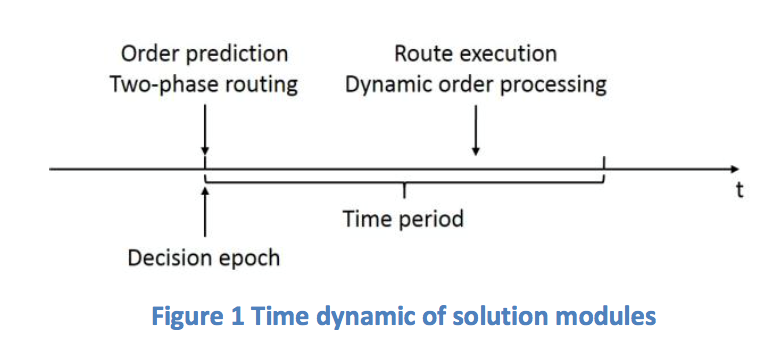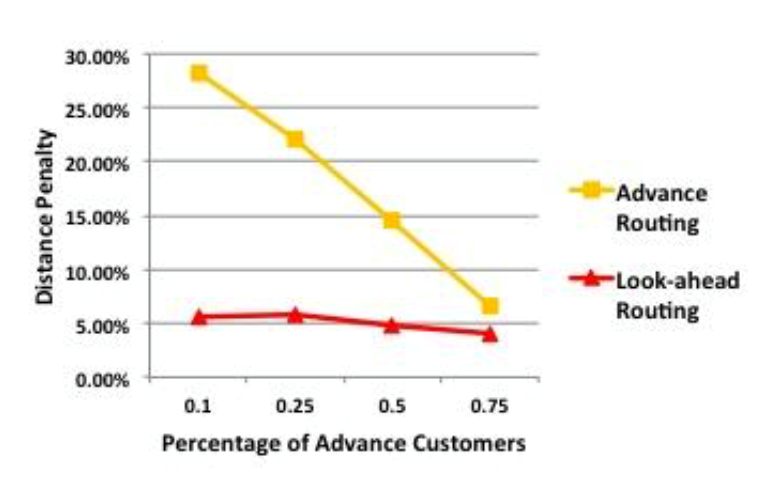News | METRANS Research Suggests Opportunities for Improved Efficiency of Integrated Freight and Passenger Systems
Stop the VideoNews

METRANS UTC
METRANS Research Suggests Opportunities for Improved Efficiency of Integrated Freight and Passenger Systems
Friday, December 30, 2016
by By Yilin Zhang, MPL 2018
Steady growth in the volume of container traffic at ports contributes to congestion and threatens accessibility at many terminals. The congestion at the ports, in turn, contributes to congestion on the adjacent metropolitan transportation roadway network. At the same time, the highly competitive trucking industry is driven by the need to satisfy consumer demands and to operate at its lowest possible cost. Logistic Service Providers (LSPs) face uncertainties throughout various stages of operation.
One problem faced by an urban logistic service is referred to as a Dynamic Vehicle Routing Problem (DVRP); essentially when customers do not request service everyday or on a regular basis, it is difficult to use a single scheduling method to fulfill all shipping requests. To address this problem, METRANS researcher Professor Maged M. Dessouky, along with Ph.D. student Han Zou (both from the University of Southern California (USC), Department of Industrial and Systems Engineering) conducted a research project titled “Efficiencies in Freight and Passenger Routing and Scheduling.”
They first developed a forward-thinking, dynamic, partial vehicle routing optimization framework. Then, they constructed a rolling horizon framework embedded with Partial Vehicle Routing Problems (VRPs), which contains both known and forecasted information. After this, they developed three solution modules that sequentially and periodically construct and solve the VRPs. Another module was built to handle dynamic customer orders. Figure 1 illustrates the time dynamic of the solution modules.

Figure 1: Time Dynamic of Solution Modules
Source: Dessouky, M. M., & Zou, H. (2015). Efficiencies in Freight & Passenger Routing & Scheduling (METRANS Project 2-1a).
They performed simulation experiments on well-known benchmark problem instances in the literature. For each instance, they compare the quality of their solution with other routing strategies (shown in figure 2).

Figure 2 Comparison of Two Strategies
Source: Dessouky, M. M., & Zou, H. (2015). Efficiencies in Freight & Passenger Routing & Scheduling (No. METRANS Project 2-1a).
The results show that the look-ahead routing strategy with forecasting of future requests outperforms a routing strategy that only makes use of the known demand information in terms of total travel distance for instances with relatively fewer advance requests and more dynamic requests.
Their study demonstrates the advantages of the look-ahead dynamic routing strategy, especially in situations with fewer advance and more dynamic requests. As such, their research suggests an approach that would decrease freight vehicle miles traveled, while reducing its negative influence on passenger travel. This is particularly helpful in large metropolitan areas like Los Angeles because both passengers and freight share the same, heavily traveled road network.
To view the full research report, click here
Maged M. Dessouky
Maged M. Dessouky is a Professor in the Daniel J. Epstein Department of Industrial and Systems Engineering and Director of the Epstein Institute, both at USC. Dessouky has an in-depth theoretical and practical understanding of models and heuristic methods for transportation system optimization. He is the Principal Investigator of an FHWA-funded project to develop Transportation Market, a distributed system for negotiating routes and prices between consumers and providers of transportation. He area editor of Computers and Industrial Engineering, ACM Transactions of Modeling and Computer Simulation and IIE Transactions, and serves on the Editorial Board of Transportation Research Part B. He is the recipient of the 2007 Transportation Science and Logistics Best Paper Prize for his paper, “Optimal Slack Time for Schedule-Based Transit Operations,” and is a Fellow of IIE. He received his Ph.D. in Industrial Engineering from the University of California, Berkeley, and M.S. and B.S. degrees from Purdue University.
Yilin Zhang
Yilin Zhang is a student assistant at METRANS Transportation Center, where she specializes in center administration. She is a first-year Master of Planning student at the USC Price School of Public Policy with a transportation concentration. She is interested in transportation as well as Geographic Information Systems and is plans to pursue a career in these fields.
News Archive
- December (1)
- November (6)
- October (4)
- September (2)
- August (3)
- July (4)
- June (3)
- May (7)
- April (8)
- March (11)
- February (8)
- January (7)
- December (7)
- November (8)
- October (11)
- September (11)
- August (4)
- July (10)
- June (9)
- May (2)
- April (12)
- March (8)
- February (7)
- January (11)
- December (11)
- November (5)
- October (16)
- September (7)
- August (5)
- July (13)
- June (5)
- May (5)
- April (7)
- March (5)
- February (3)
- January (4)
- December (4)
- November (5)
- October (5)
- September (4)
- August (4)
- July (6)
- June (8)
- May (4)
- April (6)
- March (6)
- February (7)
- January (7)
- December (8)
- November (8)
- October (8)
- September (15)
- August (5)
- July (6)
- June (7)
- May (5)
- April (8)
- March (7)
- February (10)
- January (12)















